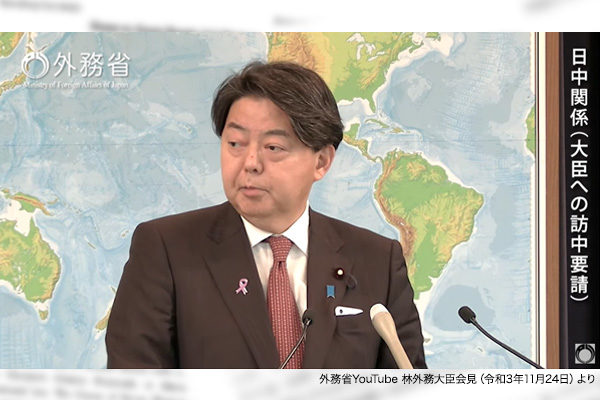Foreign Minister Yoshimasa Hayashi may still be conscious of the presidency of the Japan-China Friendship Parliamentarians’ Union that he resigned when assuming the foreign portfolio. At a time when a diplomatic boycott of the Beijing Winter Olympics opening ceremony next February has become a focus of controversy in the international community, he has revealed that he has been invited by his Chinese counterpart Wang Yi to visit China.
Just after his telephone talks with Wang on November 18, neither the Japanese nor the Chinese side made mention of the invitation. In a Fuji Television program on November 21, however, Hayashi said that he received the invitation from the Chinese side. Specific arrangements for his China visit had yet to start, he added. In a BS Asahi program on the same day, however, Hayashi said he would make arrangements in response to the invitation. He thus demonstrated that he is positive about his face-to-face talks with Wang.
Leaning to promoting Japan-China economic exchange
Problems are not limited to the invitation. Hayashi and Wang at their telephone talks agreed to bolster Japan-China economic and human exchange as the two countries mark the 50th anniversary of the normalization of relations next year. Hayashi proposed Japanese business leaders’ online talks with Chinese Premier Li Keqiang, according to diplomatic sources. The Japan-China Economic Association and other business organizations had annually sent a delegation to China for talks with Premier Li before the coronavirus pandemic originated from Wuhan, China, suspended the visit. Hayashi’s proposal indicates that he is leaning to hurrying up with resuming such exchange.
The Japan-China Economic Association and the Japan-China Friendship Parliamentarians’ Union are among the seven Japanese organizations recognized by Beijing as friendly to China. During his China visit in May 2018, Hayashi met with Li Zhanshu, chairman of the Standing Committee of the National People’s Congress, who is close to Chinese President Xi Jinping. The Chinese side publicized at the time that Hayashi had expressed active support to China’s Belt and Road Initiative.
In January this year, Hayashi and other friendly organization representatives held a video meeting with Chinese Ambassador to Japan Kong Xuanyou to exchange New Year greetings. The website of the Chinese Embassy in Tokyo said the Japanese representatives appreciated the achievements of China that fought against the coronavirus and made positive economic growth ahead of the rest of the world. They also expressed their wish to improve public opinions in both countries by enhancing bilateral exchange and cooperation through the Tokyo Olympics and the Beijing Winter Olympics, according to the website.
Do not follow in footsteps of those flattering China
Hayashi is reluctant to be described as a Chinese sympathizer or flatterer and describes himself as a China hand. If so, I would ask him how far he has conveyed Japan’s serious concerns about Chinese government ships’ provocative actions around the Senkaku Islands and China’s human rights abuses.
In 2008, then Japanese Prime Minister Yasuo Fukuda attended the opening ceremony of the Beijing Summer Olympics, despite lingering concerns about Chinese human rights issues. When he ran in the ruling Liberal Democratic Party’s presidential election in September 2007, Fukuda told a press conference: “Do you do what a friend of you does not like? You may not do so. This is the same case with international relations. We do not have to dare to do what the other side does not like.” This was not a remark that any person about to become a nation’s top leader would make. A foreign minister is not in a position to promote “friendly diplomacy.” I hope Hayashi would not follow in Fukuda’s footsteps.
Takashi Arimoto is a Planning Committee member, Japan Institute for National Fundamentals, and publisher of Monthly Magazine SEIRON at the Sankei Shimbun newspaper.


